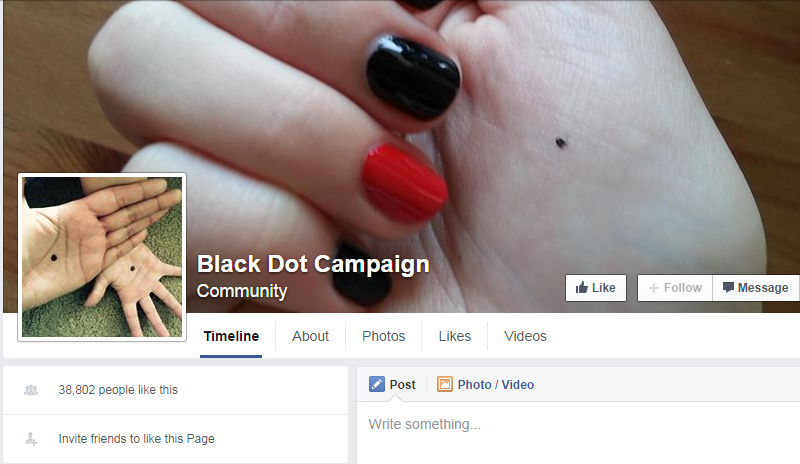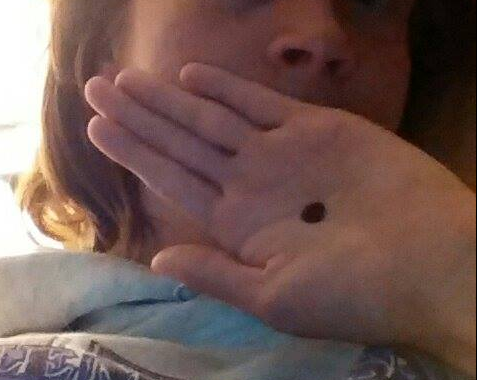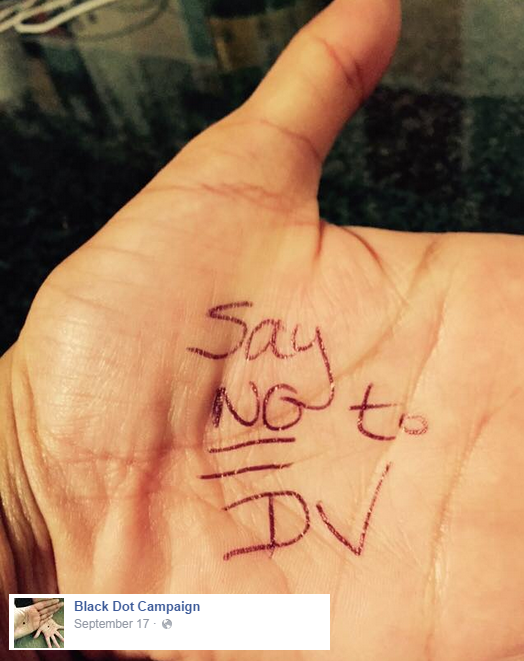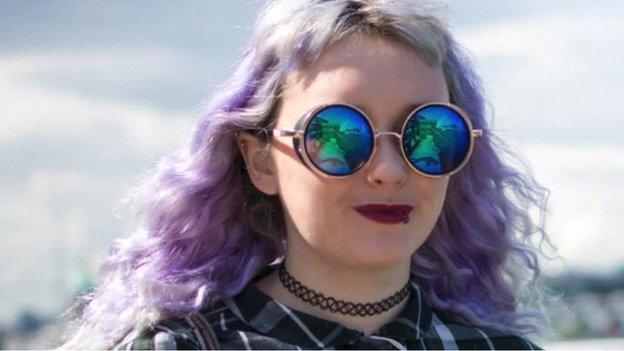Can a black dot on a victim's hand help tackle domestic violence?
- Published

The founder of a Facebook campaign designed to get help to domestic abuse victims says some of its critics have misunderstood its aims
The idea of a black dot on victims' hands, to help tackle domestic violence, has been widely spread on Facebook - but also heavily criticised. Now, its founder defends the idea.
The idea behind the Black Dot campaign is this: victims of domestic violence can draw a black dot on their hand as a silent signal. Once it becomes widely enough understood, people who see the dot on their friends' hands can approach them and have a conversation about abuse.
It's certainly now widely known: the campaign page racked up 40,000 likes, with many of its posts shared even more widely than that, and the founder says Facebook's statistics indicate it's been seen by millions (although the page was later taken down).
But as the Black Dot has garnered media attention, it's also been criticised by people who worry that a specific symbol highlighting domestic violence would draw unwanted attention to victims, external - and thus risk the wrath of their abusers. Others have pointed out that professionals and support agencies won't have received training, external on what to do when spotting someone with a black dot on their hand.
"It seems a good idea but with wide coverage then the abusers will know what this thing means," one man wrote on the campaign's Facebook page.
Now, the woman behind the campaign says critics have missed the point. In fact, she never meant for people to post selfies of their hands with a dot.
The founder is a British woman who wishes to remain anonymous because of her history as a domestic abuse victim. She told BBC Trending that although it started on Facebook, the campaign was never about encouraging abuse victims to post pictures of themselves online.
"I imagined it as a tool to start face-to-face conversations between friends, or with professionals," she told BBC Trending. "I was basing it on my experiences and I was thinking, how could I prompt people to talk about domestic violence? A black dot is easy to make, and easy to erase. As a female, you could go to the toilet, draw one on with mascara, and then later wipe it out. Being in the centre of your palm, you could close your palm and hide it from view.
"As a way of seeking help, it's not going to be a solution for everybody. As a victim, you know what triggers your abuser," she says. "So if it's not safe to draw a black dot, don't do it. Just because you're a victim doesn't mean you're stupid - you know yourself what is safe and what is not safe."

Many people have been posting black dot pictures to the campaign page
The founder says she's been overwhelmed and appreciative of supportive messages that she has received from people around the world, but that instead of drawing black dots in solidarity, the campaign is now encouraging supporters who aren't at immediate risk of abuse to write "Say no to domestic violence" on their hands to avoid confusion.
"When things go viral and worldwide, you kind of lose control. A lot of survivors are putting their dots on their hand, but that's not what the original idea was," she says. Doctors, police and social workers, she hopes, will become more aware of what the black dot means, and there's no "special training" needed - at that point their existing professional training will kick in.
"Human nature means that in a lot of situations, we don't intervene," the founder says. "We're polite, and a lot of victims are in a very lonely and scary place. It makes it very difficult to reach out and talk to people. The point of this campaign is to overcome those barriers."

Instead of drawing a black dot on their palms, the campaign's founder is urging supporters and survivors who aren't in immediate danger to write "Say no to domestic violence"
The founder says she's also received hundreds of messages from people who say they've been helped since the campaign began. Some have used the black dot technique, others have simply heard about the campaign and been prompted to seek help because of it. On the campaign's Facebook page one woman related a story of an encounter with a hospital worker.
"I had to have an examination so the consultant asked me to lie on the bed and drew the curtain. I leant over and took the pen out of his pocket, pulled his hand over to me and wrote HELP ME. I didn't have to say a word. This campaign gave me the strength and the idea how to ask for help," the message said. "I am now safe somewhere else thanks to that consultant and the black dot campaign."
Alice Stride, a spokeswoman for Women's Aid, external, which along with the charity Refuge, external runs the UK's National Domestic Violence Helpline, external, cautioned against universal adoption of the black dot.
"We would remind people of how different perpetrators can behave," Stride says. "In many situations - the perpetrators do monitor victims very closely. If there's any noticeable change, for instance if they forget to wash the dot off their hand, that could lead to further abuse."
Still, she says, the organisation welcomes the black dot campaign, and it might be an effective way for many people to get help. "It's very difficult for women to speak out about their abuse, they're worried they won't be believed," Stride says. "Being able to communicate is the first step, and this campaign provides women another way to do that."
BBC Trending has previously looked at the debate over publicising allegations of domestic violence online and whether social media can really be a useful tool.
Blog by Mike Wendling, external
Next story: Humans of New York come to the British Isles

The lives of random strangers are being documented on blogs around the world that imitate the style of Humans of New York, and the trend is now established across the British Isles. READ MORE
You can follow BBC Trending on Twitter @BBCtrending, external, and find us on Facebook, external. All our stories are at bbc.com/trending.